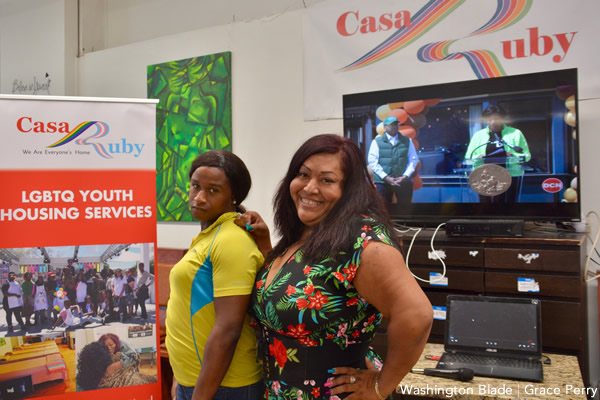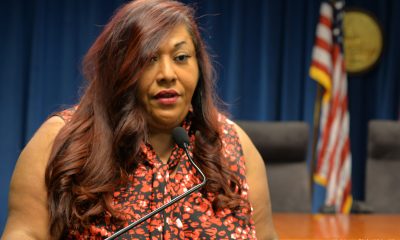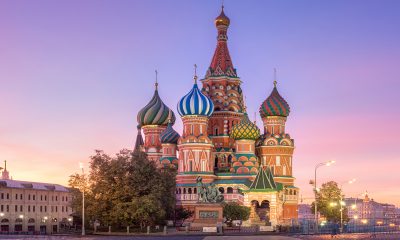Arts & Entertainment
SPOTLIGHTING LGBT HOMELESSNESS: Casa Ruby offers short- and long-term housing
Founder is trans immigrant and former homeless person
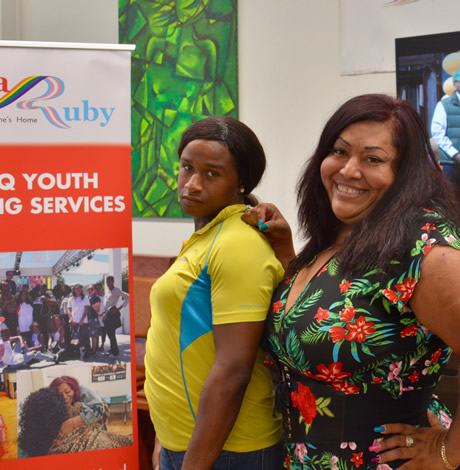
This story is part of our contribution to the 2018 #DCHomelessCrisis news blitz. Local media outlets will be reporting and discussing stories about ending homelessness in the nation’s capital all day. The collaborative body of work is cataloged at dchomelesscrisis.press.
During the early 1990s, Ruby Corado spent most nights in public parks throughout D.C., trying to meet the basic needs of the homeless LGBT youth who had no safe space to go after 5 p.m. when the HIV clinics closed.
And so the movement began.
Now, 26 years later, Corado is the director of Casa Ruby, a local bilingual and multicultural organization founded in 2012 that provides housing and social services to LGBT individuals 24 hours a day.
The transgender El Salvador native says Casa Ruby started as an “emergency room.”
“We were taking care of very sick people that were disposed (of) by society and that were barely holding on,” she says.
While the organization continues to do emergency work when necessary, its primary focus is now on preventative work and long-term planning and personal development.
“Our goal is to have someone come to Casa Ruby and three years down the line, they will no longer be homeless,” Corado says.
Casa Ruby can accommodate up to 100 individuals across its four housing programs: hypothermia or low barrier, short-term, transitional and permanent. Residents in every program receive three meals a day, meaning Casa Ruby prepares and delivers 4,000 meals every month.
Open 24 hours a day, 365 days a year, the hypothermia or low barrier program offers anyone in need a place to rest with no commitment or age restrictions. At least one case manager is on site at all times. Corado estimates that Casa Ruby has housed 9,600 people in this program over the past six months alone.
“We never close,” Corado says. “Our doors are always open.”
Stephanie Carey, a current resident at Casa Ruby since February, sees the organization as the oasis Ruby intended. The 29-year-old Maryland native recently moved to D.C. to join the Casa Ruby community.
“I had been kind of ostracized by my family. I come from a very Evangelical, southern, conservative family,” Carey says, who identifies as pansexual and outside the gender binary. “I was going through some hard times and I Googled LGBT shelters and Casa Ruby was the first one that popped up.”
All three of the other housing programs are reserved for LGBT youth ages 18-24. The short-term program provides these clients stable housing and support services for three-six months and aims to help them transition to more permanent housing. Transitional housing is similar to short term, but clients may stay up to 18 months. Also, it requires that residents complete 35 hours of “personal improvement” each week. These hours may be completed any number of ways, including through school or an employment service.
Permanent housing is designed for residents who have stable jobs but are unable to secure long-term housing.
“Landlords never really saw them as ideal renters” because “they were either too gay, too black, or too big or something,” Corado says. These residents work and pay rent for these houses owned by Casa Ruby.
The only eligibility requirement might surprise you.
“When you come to Casa Ruby, you don’t have to be willing to give love to other people, but you have to be willing to accept it, and it begins with that,” Corado says.
Around 215 youth have gone through short-term, transitional and permanent housing since 2012. Despite currently having 100 beds, Casa Ruby still has a 100-person waitlist for its programs, which it’s hoping to eliminate with more funding and resources.
In 2017, Casa Ruby’s annual operating budget was $1.7 million and Corado projects 2018’s will be around $2.1 million. Approximately half of the budget comes from government support and the other half comes from individual donations and grants from foundations.
“We have thousands of one-dollar donations,” Corado says. “Which is great because I think it stays true to the mission of being grassroots.”
Even though her advocacy and activism has changed and evolved over the past few decades, Corado says her role has fundamentally stayed the same: “My job as the founder and director today still is to make sure that we restore dignity to people that have been denied their dignity for so long.”
For Carey, Casa Ruby serves a multitude of purposes from simply “a place to rest your head” to a space “to be around people you identify with. … Casa Ruby is everybody’s home.”
Arts & Entertainment
Catherine O’Hara, ‘Schitt’s Creek’ star and celebrated queer ally, dies at 71
Actress remembered for memorable comedic roles in ‘Beetlejuice’ and ‘Home Alone’
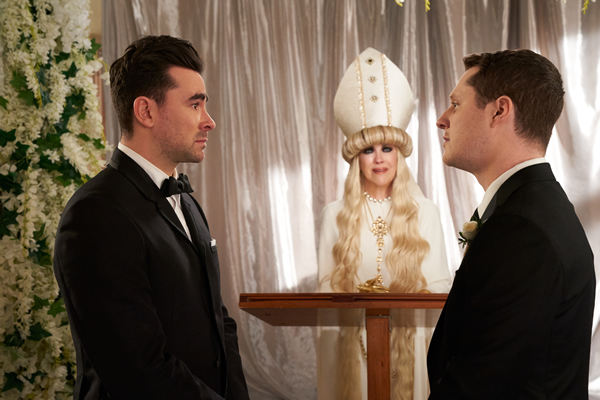
Catherine O’Hara, the varied comedic actor known for memorable roles in “Beetlejuice,” “Schitt’s Creek,” and “Home Alone,” has died at 71 on Friday, according to multiple reports. No further details about her death were revealed.
O’Hara’s death comes as a shock to Hollywood, as the Emmy award-winning actor has been recently active, with roles in both “The Studio” and “The Last of Us.” For her work in those two shows, she received Emmy nominations for outstanding supporting actress in a comedy series and outstanding guest actress in a drama series.
In 2020, O’Hara won the Outstanding Lead Actress in a comedy series award for her work in the celebrated sixth and final season of “Schitt’s Creek.” She was also known as a queer ally and icon for her theatrical and often campy performances over multiple decades. In “Schitt’s Creek,” she played Moira Rose, the wig-loving mother of David Rose (played by series creator Dan Levy). David is pansexual, but the characters around him simply accept him for who he is; the show was embraced by the LGBTQ community with how naturally David’s sexuality was written and portrayed. That show ran from 2015 to 2020 and helped bring O’Hara and her co-stars into a new phase of their careers.
In a 2019 interview with the Gay Times, O’Hara explained why the show got LGBTQ representation right: “Daniel has created a world that he wants to live in, that I want to live in. It’s ridiculous that we live in a world where we don’t know how to respect each other and let each other be. It’s crazy. Other shows should follow suit and present the world and present humans as the best that we can be. It doesn’t mean you can’t laugh, that you can’t be funny in light ways and dark ways. It’s all still possible when you respect and love each other.”
Additional credits include “SCTV Network” (for which O’Hara won a writing Emmy), “Beetlejuice Beetlejuice,” “Curb Your Enthusiasm,” “Six Feet Under,” “Best in Show,” “Home Alone 2: Lost in New York,” and “Dick Tracy.” O’Hara also lent her voice to “The Nightmare Before Christmas,” “Chicken Little,” “Monster House,” and “Elemental.” O’Hara was expected to return for Season 2 of “The Studio,” which started filming earlier this month.

Friday, January 30
Friday Tea Time will be at 12 p.m. at the DC Center for the LGBT Community. This is a social hour for older LGBTQ+ adults. Bring your beverage of choice. For more information, contact Mac ([email protected]).
Spark Social will host “RuPaul’s Drag Race S18 Watch Party” at 8 p.m. This event will be hosted by local drag queens TrevHER and Grey, who will provide hilarious commentary and make live predictions on who’s staying and who’s going home. Stick around after the show for a live drag performance. This event is free and more details are available on Eventbrite.
Saturday, January 31
Go Gay DC will host “LGBTQ+ Community Brunch” at 11 a.m. at Freddie’s Beach Bar & Restaurant. This fun weekly event brings the DMV area LGBTQ+ community, including allies, together for delicious food and conversation. Attendance is free and more details are available on Eventbrite.
Sunday, February 1
Go Gay DC will host “LGBTQ+ Community and Conversation” at noon at As You Are. This event is for those looking to make more friends and meaningful connections in the LGBTQ+ community. Look for the Go Gay DC sign on the long table near the front window. Attendance is free and more details are available on Eventbrite.
Monday, February 2
“Center Aging: Monday Coffee Klatch” will be at 10 a.m. on Zoom. This is a social hour for older LGBTQ+ adults. Guests are encouraged to bring a beverage of choice. For more information, contact Adam (adamheller@thedccenter.org).
Tuesday, February 3
Universal Pride Meeting will be at 7 p.m. on Zoom. This group seeks to support, educate, empower, and create change for people with disabilities. For more information, email [email protected].
Wednesday, February 4
Job Club will be at 6 p.m. on Zoom upon request. This is a weekly job support program to help job entrants and seekers, including the long-term unemployed, improve self-confidence, motivation, resilience and productivity for effective job searches and networking — allowing participants to move away from being merely “applicants” toward being “candidates.” For more information, email [email protected] or visit thedccenter.org/careers.
Center Aging Women’s Social and Discussion Group will be at 7 p.m. on Zoom. This group is a place where older LGBTQ+ women can meet and socialize with one another. There will be discussion, activities, and a chance for guests to share what they want future events to include. For more details, visit the DC Center’s website.
Thursday, February 5
The DC Center’s Fresh Produce Program will be held all day at the DC Center for the LGBT Community. People will be informed on Wednesday at 5:00 pm if they are picked to receive a produce box. No proof of residency or income is required. For more information, email [email protected] or call 202-682-2245.
Virtual Yoga Class will be at 7 p.m. on Zoom. This free weekly class is a combination of yoga, breath work and meditation that allows LGBTQ+ community members to continue their healing journey with somatic and mindfulness practices. For more details, visit the DC Center’s website.
a&e features
D.C. LGBTQ sports bar Pitchers listed for sale
Move follows months of challenges for local businesses in wake of Trump actions
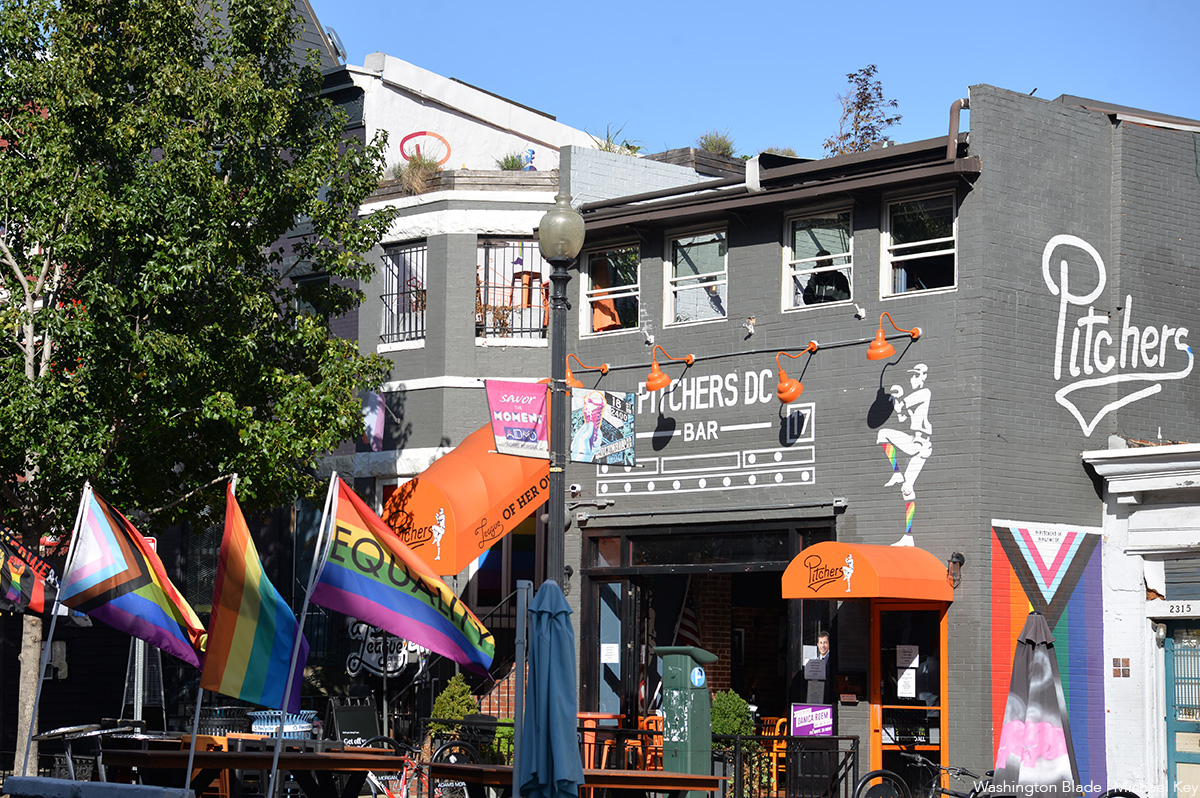
A Santa Monica, Calif.-based commercial real estate company called Zacuto Group has released a 20-page online brochure announcing the sale of the D.C. LGBTQ sports bar Pitchers and its adjoining lesbian bar A League of Her Own.
The brochure does not disclose the sale price, and Pitchers owner David Perruzza told the Washington Blade he prefers to hold off on talking about his plans to sell the business at this time.
He said the sale price will be disclosed to “those who are interested.”
“Matthew Luchs and Matt Ambrose of the Zacuto Group have been selected to exclusively market for sale Pitchers D.C., located at 2317 18th Street, NW in Washington, D.C located in the vibrant and nightlife Adams Morgan neighborhood,” the sales brochure states.
“Since opening its doors in 2018, Pitchers has quickly become the largest and most prominent LGBTQ+ bar in Washington, D.C., serving as a cornerstone of D.C.’s modern queer nightlife scene,” it says, adding, “The 10,000+ SF building designed as a large-scale inclusive LGBTQ+ sports bar and social hub, offering a welcoming environment for the entire community.”
It points out that the Pitchers building, which has two years remaining on its lease and has a five-year renewal option, is a multi-level venue that features five bar areas, “indoor and outdoor seating, and multiple patios, creating a dynamic and flexible layout that supports a wide range of events and high customer volume.”
“Pitchers D.C. is also home to A League of Her Own, the only dedicated lesbian bar in Washington, D.C., further strengthening its role as a vital and inclusive community space at a time when such venues are increasingly rare nationwide,” the brochure says.
Zacuto Group sales agent Luchs, who serves as the company’s senior vice president, did not immediately respond to a phone message left by the Blade seeking further information, including the sale price.
News of Perruzza’s decision to sell Pitchers and A League of Her Own follows his Facebook postings last fall saying Pitchers, like other bars in D.C., was adversely impacted by the Trump administration’s deployment of National Guard soldiers on D.C. streets
In an Oct. 10 Facebook post, Perruzza said he was facing, “probably the worst economy I have seen in a while and everyone in D.C. is dealing with the Trump drama.” He told the Blade in a Nov. 10 interview that Pitchers continued to draw a large customer base, but patrons were not spending as much on drinks.
The Zacuto Group sales brochure says Pitchers currently provides a “rare combination of scale, multiple bars, inclusivity, and established reputation that provides a unique investment opportunity for any buyer seeking a long-term asset with a loyal and consistent customer base,” suggesting that, similar to other D.C. LGBTQ bars, business has returned to normal with less impact from the Trump related issues.
The sales brochure can be accessed here.
-

 LGBTQ Non-Profit Organizations4 days ago
LGBTQ Non-Profit Organizations4 days agoTask Force urges renewed organizing amid growing political threats
-

 Russia4 days ago
Russia4 days agoRussia designates ILGA World an ‘undesirable’ group
-

 Federal Government4 days ago
Federal Government4 days agoTop Democrats reintroduce bill to investigate discrimination against LGBTQ military members
-

 Virginia4 days ago
Virginia4 days agoFrom the Pentagon to politics, Bree Fram fighting for LGBTQ rights

